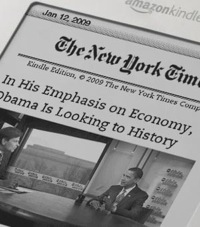 Publishers Lunch is a daily pay newsletter for the book publishing industry. (Speaking of business models, here’s one: Find a niche; create great content that serves that niche; hide it behind a pay wall and charge. I pay $20 a month for that daily email, and I don’t even expense it to my employers! There are more Publishers Lunches out there waiting to be founded.)
Publishers Lunch is a daily pay newsletter for the book publishing industry. (Speaking of business models, here’s one: Find a niche; create great content that serves that niche; hide it behind a pay wall and charge. I pay $20 a month for that daily email, and I don’t even expense it to my employers! There are more Publishers Lunches out there waiting to be founded.)
Today’s issue points to this page on Amazon’s user forums, which is dedicated to surveying Kindle owners about their age. (And, along the way, a variety of other details.) More than 1,000 people have posted their info to the forum, and Publishers Lunch took a sample of about 700 of them and ran the numbers.
I won’t steal their thunder (seriously, they’re worth $20 if you’re interested in publishing), but I’ll note two of their findings. First:
…over half of reporting Kindle owners are 50 or older, and 70 percent are 40 or older.
I caught some flak a couple months back for questioning the potential success of the Kindle by noting that at a conference dedicated to ebooks and the electronic future of publishing, filled with the nerdiest slice of New York’s publishing world, barely anyone there owned a Kindle. I said that those folks (and nerdy booklovers like me) are the Kindle’s target audience, and I don’t see the device getting much market penetration with them.
Apparently, I surmised the target audience incorrectly. It’s older folks — not the gadget crowd, not the young bookloving crowd, and not the mathematical intersect of the two.
The second finding of note from Publishers Lunch:
So many users said they like Kindle because they suffer from some form of arthritis that multiple posters indicate that they do or do not have arthritis as a matter of course. A variety of other impairments, from weakening eyes and carpal-tunnel-like syndromes to more exotic disabilities dominate the purchase rationales of these posters.
In other words, it’s primarily a particular segment of older folks that the Kindle appeals to — those for whom the traditional dead-tree reading experience is painful or difficult.
Publishers Lunch’s numbers match up pretty well (although not exactly) with those crunched by a forum user named Zach Sherwood, who posted last week that he is doing his own survey of Kindle owners:
Age correlates, in a positive direction, to ownership — up to the age of 60. The largest percentage of Users, at almost 30% are in the 51-60 year old age category. 24% are 41-50, 19% 31-40 and 16% are 61 plus. I am still processing results, but thought I would crunch these quickly as this is clearly a popular question in the forum. I’ll share other demos when I process them (preview: 66% of you are women).
I’m thrilled that the Kindle is reaching an audience that is not being well served by printed books. (There’s a lot of arthritis running through my family tree.) But to my non-business-school eyes, that doesn’t look like the makings of a breakout hit on the scale that the oft-repeated phrase “the iPod of books” implies. After all, the Kindle audience demographically looks an awful lot like the print newspaper audience.
I continue to maintain that ebooks will be huge — but that the most likely technology for ebook distribution and consumption remains a cell phone or a netbook-like device that will do many things other than be an ebook reader. Few people will sign on to carry one more gadget with them when there’ll be a perfectly capable web-enabled device already in their pockets. And the Kindle’s famously clunky interface design makes me think that multipurpose device is much more likely to be developed by someone like Apple than by Amazon.
Amazon’s made moves in this direction in the last two months — by creating an iPhone app that lets you read Kindle books and, just two days ago, buying Lexcycle, the creator of Stanza, the first-mover iPhone book-reading app.
Amazon hasn’t released sales figures for the physical Kindle or download numbers for the iPhone app, but I’d wager there are already significantly more iPhones that can read Kindle books than actual Kindles. On a recent trip, I used the iPhone app to buy Dalton Conley’s very fine (and lengthily subtitled) new book and read the whole thing in a few inflight hours. It was a surprisingly pleasant experience; if the book’s good, it seems, you can get the same feeling of absorption in the work on an LCD screen as on 80-pound bond.
One last note: I wonder if knowing Kindle users tend to be older dampen some of the enthusiasm for newspapers looking to the Kindle as a revenue source?
Many news organizations love the notion that the Kindle magically transforms digital freeloaders into people willing to plop down $13.99 a month for an electronic edition of their favorite newspaper on their ebook reader. But if Kindle users are disproportionately older, that means that those people paying for newspapers on them are largely the same people who already pay for newspapers — the older print audience. In other words, it looks like the Kindle isn’t training young people to be willing to pay for news; it may just be moving existing print subscribers to a digital subscription.
That could still be a good thing, depending on how print and Kindle margins compare to one another. But it’s not the lifesaver some news folks were hoping for.